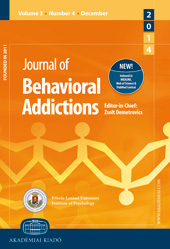Treatments for Compulsive Buying: A systematic Review of the Quality, Effectiveness and Progression of the Outcome Evidence
Treatments for Compulsive Buying: A systematic Review of the Quality, Effectiveness and Progression of the Outcome Evidence
Author(s): Ben Hague, Jo Hall, Stephen KellettSubject(s): Cognitive Psychology, Behaviorism, Psychoanalysis, Substance abuse and addiction, Socio-Economic Research
Published by: Akadémiai Kiadó
Keywords: compulsive buying disorder; effectiveness; treatments; meta-analysis; review;
Summary/Abstract: This review appraises the progression and status of the evidence base for the treatment of compulsive buying disorder (CBD), in order to highlight what currently works and to prompt useful future research. Methods: Online databases ISI Web of Knowledge, PsycINFO, and PubMed via Ovid were searched at two time points. Two quality checklists and an established model of therapy evaluation (hourglass model) evaluated the quality and progression of both psychotherapy and pharmacotherapy treatments for CBD. Uncontrolled effect sizes were calculated and meta-regression analyses were performed regarding treatment duration. Results: A total of 29 articles met the inclusion criteria, which were divided into psychotherapy (n = 17) and pharmacotherapy treatments (n = 12). Of the 29 studies, only 5 studies have been tested under conditions of high methodological quality. Both forms of treatment had been evaluated in a haphazard manner across the stages of the hourglass model. Although large effects were demonstrated for group psychotherapy and pharmacotherapy, such evidence of effectiveness was undermined by poor study quality and risk of publication bias. Long-term CBD treatment was associated with improved outcome with pharmacotherapy, but not when delivering psychotherapy. Discussion: Group psychotherapy currently appears the most promising treatment option for CBD. Poor methodological control and sporadic evaluation of specific treatments have slowed the generation of a convincing evidence base for CBD treatment. Defining the active ingredients of effective CBD treatment is a key research goal.
Journal: Journal of Behavioral Addictions
- Issue Year: 5/2016
- Issue No: 3
- Page Range: 379-394
- Page Count: 16
- Language: English

